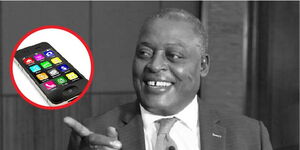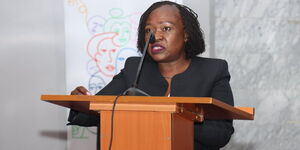President-elect William Ruto filed his response at the Supreme Court contesting the requests made in Azimio La Umoja Presidential candidate Raila Odinga and his running mate Martha Karua in their petition.
Raila wanted the apex court to direct the Independent Electoral and Boundaries Commission (IEBC) to tally and verify votes and declare Raila and Karua duly elected as President-Elect and Deputy President Elect respectively.
Ruto in his response stated that it was hypocritical for Raila to demand to be declared the winner yet he claims that none of the candidates met the 50 per cent+ 1 threshold.
He also opined that the apex court has no jurisdiction to grant the relief sought in the Raila-Karua Petition. Ruto added that the petition would contravene Article 140 (3) of the Constitution.
The Article states that ‘If the Supreme Court determines the election of the President-elect to be invalid, a fresh election shall be held within sixty days after the determination. Ruto thus advocated for a re-run rather than declaring Raila as president-elect.
He, however, claimed that Raila all along has been seeking a re-run. Ruto cited the three petitions the Azimio La Umoja filed in 2022, 2017 and 2013.
“The first distinct common feature that underlies Raila’s thirty-year pattern of strikingly similar acts after every presidential election is disingenuous disputation of presidential results as a means of forcing the winner to share power through unconventional and extra-constitutional government arrangements popularly known as “handshake”.”
Ruto also claimed that it is disingenuous for the petitioners to pursue the relief while at the same time claiming that the election was not conducted following the principles set out in the Constitution and relevant election laws.
He further challenged that declaring Chebukati unfit to hold office would plunge the country into a constitutional crisis.
IEBC Subverting the Will of the People
Ruto stated that he believes the IEBC conducted the election in substantial compliance with the principles laid down in the Constitution and the Elections Act.
He referred to the Maina Kiai case which stated that the results read at the polling station, on Form 34A, were final.
“The voting, vote counting and declaration of the result of the election were conducted at polling stations in a free, fair and transparent manner.
“Tallying and verification of election results at Bomas of Kenya were based on original Forms 34A and original Forms 34B physically delivered by Constituency Returning Officers to the National Tallying Centre,” he stated.
The President-elect also cited commendation and congratulatory messages from numerous local and foreign observers and other key participants and stakeholders.
Chebukati’s Role in the Election
Ruto stated that he was unaware of the allegations raised against Chebukati concerning the corporate mandate of the IEBC as an institution and his role as the chairperson and national returning officer.
“The original Forms 34A from polling stations should easily and quickly confirm that the result of the election declared by the Chebukati was free, fair, and verifiable.”
IEBC 4 - Cherera and the Dissenting Commissioners
Juliana Cherera, Justus Nyang'aya, Francis Wanderi and Irene Massit, Ruto argued fully participated in the tallying, verification and announcement of election results under the full glare of local and international media.
“The disaffected Commissioners only purported to disown the tallying and verification exercises after completion, and my victory became apparent,” he argued.
Rejected Votes
Raila had argued that Ruto did not attain the 50 per cent plus 1 vote threshold required to announce him the president-elect.
“I earnestly believe that perusal of the original Forms 34A, original Forms 348 and the original Form 34C will easily and quickly confirm that I attained the 50 per cent +1 threshold set,” he stated.
Deletion, Alteration and Replacement of Forms
Raila and his team had also argued that some forms were deleted, altered or replaced on the IEBC portal.
In his defence, Ruto stated that he was unaware of the allegations. All the presidential candidates he stated, should have in their possession copies of the Forms 34A that were issued to party agents at the polling station and verified at Bomas.
He also added that he was not privy to the alleged "interception," "staging," "alteration", and "dumping" of more than 11,000 Forms34A on the IEBC website.
The Damning John Githongo Affidavit
Former journalist and whistleblower, John Mark Githongo alleged that 56 individuals were hired to infiltrate IEBC systems during the election period. Ruto urged the court to dismiss what he argued was falsified evidence introduced by Raila.












